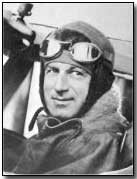Who's Who - William Mitchell
 William (Billy) Mitchell (1879-1936), considered by many the father of the
U.S. air force, led the American air effort during World War One.
William (Billy) Mitchell (1879-1936), considered by many the father of the
U.S. air force, led the American air effort during World War One.
Born on 29 December 1879 in Nice, France, Mitchell abruptly ceased his university studies to enlist as a private soldier during the 1898 Spanish-American War.
Thereafter using his father's influence as senator for Wisconsin as leverage, Mitchell secured a commission as Second Lieutenant into the U.S. Army Signal Corps. He experienced wide service, in Cuba, the Philippines and in Alaska before becoming the then-youngest member of the General Staff.
Graduating from the army's Staff College at Fort Leavenworth in 1909 Mitchell was assigned in 1915 to the aviation section of the signal corps although he was regarded as too old to attend the army's Air Service training school in San Diego. Mitchell, who had by this time developed a keen interest in aviation, circumvented this difficulty by learning to fly at his own expense.
In 1916 Mitchell was appointed to the head of the army's aviation section. Following a brief spell in Spain as a military attaché in 1917 Mitchell was posted to the Western Front with the U.S. entry into the war in April 1917.
Initially acting as an air observer attached to the British and French air forces, Mitchell was immediately struck by and impressed with his British counterpart Sir Hugh Trenchard: both forthright characters in their own right they formed a close friendship.
With U.S. Commander-in-Chief 'Black Jack' Pershing's arrival in France in June 1917 Mitchell - at this stage still only a Major - pressured Pershing into accepting his ideas for a vast U.S. air presence attached to the American Expeditionary Force (AEF).
Pershing agreed with Mitchell and charged the latter with training and organising the first American pilots. By the war's end Mitchell rose dramatically in rank, ending up as a Brigadier-General, and was awarded the Distinguished Service Cross and Distinguished Service Medal among others.
In September 1918 the energetic and tireless Mitchell planned and led a total of almost 1,500 Allied aircraft during the St. Mihiel offensive, the largest concentration of aircraft to that date. He further led several hundred bombers in attacks behind German lines. Convinced of the emerging role of aircraft in strategic bombing Mitchell was however frustrated in demonstrating his ideas by the untimely (for him) end of the war in November 1918.
Returning to the U.S. Mitchell was appointed assistant chief of the Air Service in March 1919. Never possessing great reserves of tact Mitchell succeeded in alienating many of his colleagues in both the army and navy with his strident demands for an increasingly independent role for the air force - and in his insistence upon the obsolescence of surface fleets.
To some extent he demonstrated the latter by sinking the old German battleship Ostfriesland on 21 June 1921: the first time a battleship had been sunk from the air.
Nevertheless Mitchell's ongoing feuds with senior military personnel ultimately led to his demotion to his former permanent rank of Colonel in April 1925; while not unprecedented the move was widely viewed as a punishment.
Mitchell chose not to take his punishment lying down, with unfortunate results. When the navy airship Shenandoah crashed in a storm on 3 September 1925 he went public in denunciating both the Navy and War Departments as guilty of "criminal negligence".
This merely served to bring upon Mitchell's head a spectacular court martial which resulted in his conviction for insubordination. Consequently penalised by being suspended from rank and duty for five years, Mitchell chose to resign from the army on 1 February 1926.
He published three works over the course of the following decade (including Winged Defence in 1925 and Skyways in 1930) while lecturing widely in support of air power.
William Mitchell died on 19 February 1936 in New York from a variety of ailments, including a heart complaint. He was 56. Vindicated after his death Mitchell was posthumously promoted and awarded a special medal in his honour by Congress; the latter was presented by the Chief of Staff of the newly established U.S. Air Force to Mitchell's son in 1948.
The German word "U-Boat" was derived from "Unterseeboot" (undersea boat).
- Did you know?
